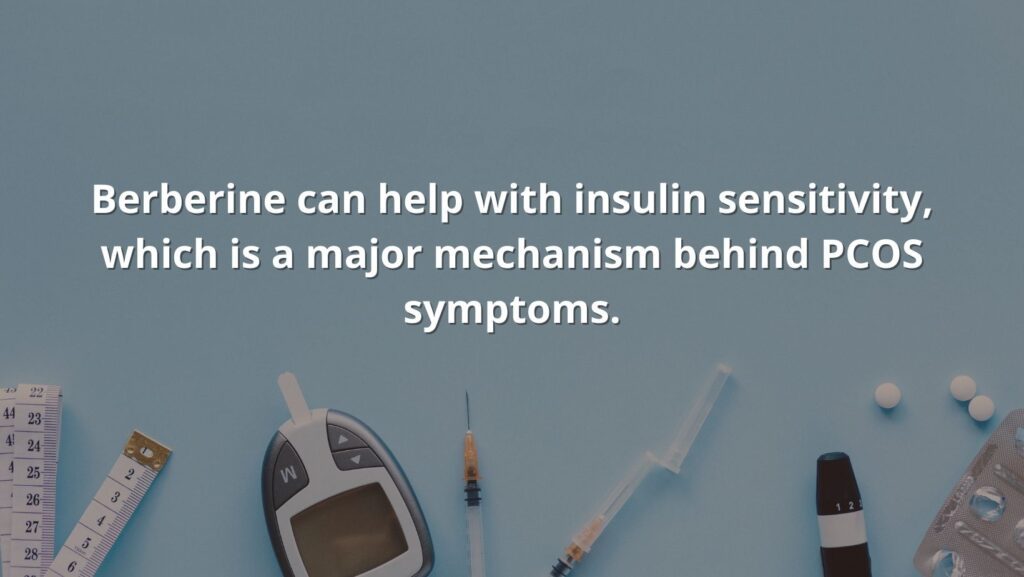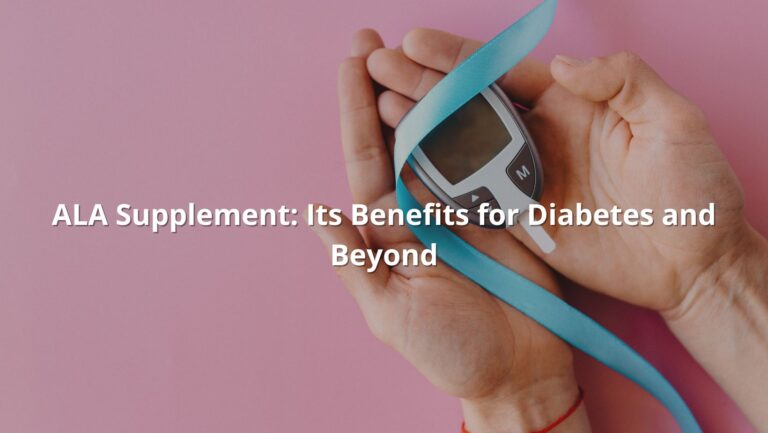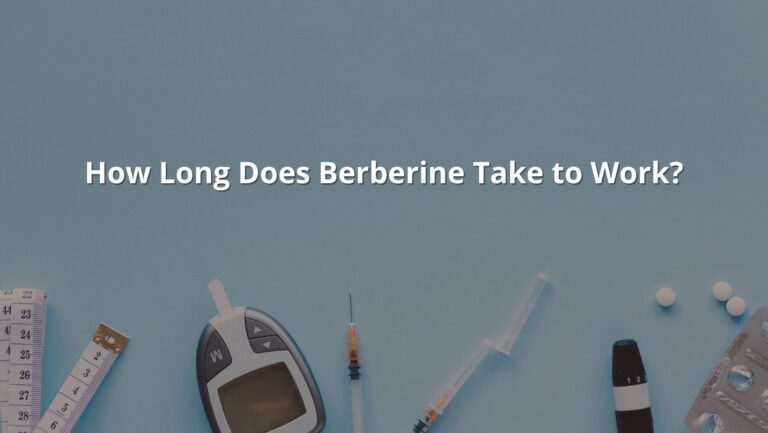Berberine for PCOS: Your In-Depth Guide to the Supplement
Hello and welcome, beautiful souls! If you’ve found your way to this article, chances are you or someone you cherish is navigating the choppy waters of Polycystic Ovary Syndrome, lovingly known as PCOS. First and foremost, I want you to know that you’re not alone – there’s a whole sisterhood out there supporting each other through the highs and lows of this condition.
Now, let’s talk about PCOS. It’s one of those uninvited guests that shows up with an assortment of symptoms such as irregular periods, weight gain, acne, or even excess facial hair. It can be overwhelming, frustrating, and sometimes even disheartening. But, while PCOS is a lifelong companion, there are ways to manage its symptoms and live a fulfilling life.
Traditionally, doctors might recommend changes in diet, exercise, or medications like birth control pills or metformin. But today, we’re going to talk about an intriguing natural alternative that’s been creating some buzz – berberine!
Berberine isn’t a new kid on the block. In fact, it’s an age-old remedy that’s been used in Chinese and Ayurvedic medicine for centuries. It’s like that ancient wisdom passed down from our ancestors, only now science is catching up to its potential benefits. It comes from the roots and bark of several plants and is known for its golden color and plethora of health benefits.
So, why are PCOS patients interested in this golden gem? Well, research suggests that berberine could have a positive impact on some of the factors that are central to PCOS, like insulin resistance and hormone regulation.
This article is your friendly guide to berberine and its potential role in managing PCOS. As a medical doctor (but not a PCOS patient myself), I’ve leaned into the science behind berberine for the condition. But, there is also plenty of stories by PCOS patients and promising reviews for berberine supplements. If you’re looking to use berberine for PCOS, know that you’re in good company!
Note: Yes, I am an MD. But, no, this isn’t medical advice. While exploring alternatives is empowering, always consult your healthcare provider before making any changes to your treatment plan. Prioritise your wellness and listen to your body – berberine is an exciting alternative but it’s not for everyone and this isn’t one-size-fits all advice.
What Is Berberine? It’s PCOS-Alleviating Benefits


Moving along, let’s get better acquainted with our guest of honor: berberine.
Historically, berberine has been a staple in Chinese and Ayurvedic medicine. In these ancient practices, it was used for its antimicrobial properties and to combat a variety of ailments ranging from digestive issues to infections.
Now let’s get to the science part, but we’ll keep it light! Berberine is an alkaloid, which simply means it’s a naturally occurring compound with a specific kind of structure. It is found in the roots, bark, and stems of various plants, including the barberry, goldenseal, and Oregon grape. These plants, rich in berberine, have been brewed into teas and concoctions for centuries by those in the know.
You can get berberine through a variety of herbs and herbal preparations. But, for best absorption, it’s often best to supplement with pure berberine.
Let’s get back to the modern day – and how berberine research has evolved. Beyond its historical uses, research is now unveiling an array of potential health benefits. These range from improving heart health and reducing inflammation to – and this is where we’re most interested – possibly helping manage the symptoms of PCOS.
Now you might be thinking, “That all sounds great, but how exactly does it work?” And that’s a great question. In simple terms, berberine seems to be a bit of a multitasker.
For PCOS specifically, it’s thought to help with insulin sensitivity, which can be a big deal because many people with PCOS have insulin resistance. It also plays a role in improving fertility, which is a frequent concern with PCOS and improving lipid profiles to reduce heart disease risk.
The golden touch of berberine doesn’t end there; we recently did a detailed comparison between berberine and metformin that covers additional benefits like weight loss support and even anti-cancer effects. Since many PCOS patients also struggle with high blood sugar and pre-diabetes, exploring the metformin-like qualities might be worth checking out – read that next 🙂
Bottom line, in the complex puzzle that is PCOS, berberine could potentially be one of those handy pieces that help complete the picture of better health. In the next section, we’ll go a little deeper into how berberine works its magic.
Can Berberine Help With Your Fertility?
Alright, now that we covered the main benefits, let’s dive deeper into a topic that’s particularly dear to the hearts of many with PCOS – fertility.
Nurturing and bringing life into the world is a miraculous journey, but for those with PCOS, this path can sometimes be more akin to a roller coaster ride. The challenges of insulin resistance and the hormonal tango that PCOS often involves can make the journey to parenthood an uphill battle.
Studies show that women with PCOS face a higher rate of infertility compared to those without the condition. This is often linked to insulin resistance, which seems to play a big part in the fertility story. This is where berberine gracefully enters the stage.
So, what does berberine do? It seems to wear many hats. We already talked about how it helps improve insulin sensitivity:
Imagine insulin as a key that opens the cells to let sugar in. In PCOS, often this key doesn’t fit well (insulin resistance), so your body keeps pumping insulin but the cells aren’t opening up. Glucose stays in your vessels for longer which, in turn, can turn into pre-diabetes or diabetes.
Berberine has a range of mechanisms to improve insulin resistance and reduce blood sugar. In fact, one trial found it can reduce diabetes markers in a way similar to diabetes medications.
Now, let’s zoom in on the ovaries. Here, insulin resistance messes with the maturation of the follicles (little sacs that contain eggs), and this can lead to irregular periods and ovulation troubles. Berberine, being the versatile player it is, helps to get things back on track.
Beyond the ovaries, there’s the lining of the uterus, known as the endometrium. This is where an embryo would snuggle in. But in PCOS, sometimes this lining isn’t as welcoming as it should be. Berberine, according to studies in animals, seems to help create a cozier environment for embryo implantation. While more research is needed to fully understand how it does this, it’s an exciting development.
Now, if you’re thinking about in vitro fertilization (IVF), berberine might have something to offer here as well. Some studies have shown that it helps improve IVF success rates to a degree comparable to metformin, a common medication used in PCOS management. Not only that, but berberine has also been found to be associated with higher live birth rates compared to placebo.
It’s important to note, though, that berberine is still a supplement. This means the FDA doesn’t regulate it as tightly as drugs. It also means it hasn’t been researched as throughly as metformin (yet.)
It seems to work best in combination with other treatments, and it might not be as effective as some fertility medications when used alone. However, it’s definitely an intriguing tool in the toolbox for managing PCOS-related fertility issues.
How to Take Berberine for PCOS?


Let’s take a moment to dive into the practical side of things: How much berberine should you take if you want help with PCOS? It’s a bit like finding the right shoe size – you want it to fit just right to be effective without causing discomfort.
Studies that have investigated the use of berberine for PCOS and other health conditions generally recommend a dosage range of 500 to 1500mg per day. To break it down further, it’s often advised to take this total daily dosage in increments, like taking a 500mg capsule three times a day. Why split it up? Well, berberine has a relatively short life in the body, and dividing the dose helps maintain steadier levels throughout the day.
Here’s another pro tip: it’s a good idea to take berberine with meals. Not only does this make it easier to remember (hello, breakfast, lunch, and dinner companions!), but it also syncs well with the fact that berberine can help manage blood sugar levels, which tend to rise after meals.
Now, as excited as you might be to give berberine a try, it’s crucial to approach with caution and thoughtfulness. Just like when you’re trying a new recipe, you want to make sure you have the right ingredients and measurements. Make sure you are buying berberine from a reputable brand, too, because of the FDA-not-regulating-things-as-tightly thing.
Also, keep in mind that while there’s a general range that works for most people, individual bodies can react differently. It’s always wise to start at the lower end of the dosage range and see how your body responds.
And here comes the golden rule (sorry to be a broken record on this one) – before incorporating berberine or any new supplement into your regimen, please, please consult your healthcare provider. This blog is here to support you with science-backed content but, no, it’s not personalised health advice.
Are There Any Side Effects I Should Worry About?
In general, berberine is among the safest supplements out there. It has been used for centuries and researched since the 80s.
So far, there haven’t been any liver damage reports with metformin and liver issues are a common concern with new herbs. Similarly, we know metformin doesn’t damage the kidneys (another point that people worry about) and it can even help certain renal conditions.
Still, like any substance that has active effects on the body, berberine comes with its set of possible side effects. Some of the common ones include gastrointestinal discomfort (such as diarrhea, stomach cramps, or bloating), constipation, and nausea. One way to avoid these is to take your berberine with a meal, which we already talked about. But, if you’re experiencing anything beyond mild symptoms, it’s probably time to cut out the supplement.
Moreover, because berberine can affect blood sugar levels, there’s a need to be cautious if you’re on medication for diabetes, as it can amplify the effects of these medications. The same goes for glucose-lowering drugs for PCOS like metformin. If your doctor put you on metformin, berberine can actually work synchronistically with that – but, you do need to discuss that with her and consider the supplement and metformin doses.
The same goes if you’re taking cholesterol-lowering medications like statins. Statins and berberine can work together to give you even more heart health benefits. However, because they’re targeting the same thing, it’s wise to consider the symbiosis before you add berberine to your regimen.
Now, let’s switch gears and talk about when it’s wise to avoid berberine. Certain scenarios call for extra caution:
- Pregnancy and Breastfeeding: Yes, berberine can help you get pregnant. But, if you’re pregnant or breastfeeding, it’s best to err on the side of caution and avoid berberine. There’s limited information on how it affects the baby, and it’s best not to take chances.
- Upcoming Surgery: Planning to have surgery? It might be wise to put berberine on pause, as it can affect blood sugar levels and blood pressure, both of which need to be stable during surgical procedures.
- Liver Conditions: Those with liver conditions should tread carefully, even though berberine doesn’t seem to affect liver function. On one hand, the supplement can help with lipid levels, which are often a concern for liver patients. On the other, there might be some liver stress we’re not noticing yet, so, again, please talk to your doctor first.
Knowledge is power, but with power comes responsibility. When considering berberine as part of your wellness toolkit, it’s paramount to proceed with your eyes wide open, acknowledging both the potential benefits and the cautions.
Berberine and PCOS: Final Thoughts
As we arrive at the end of our exploration of berberine and its potential role in managing PCOS, we hope this has been an enriching journey for you. Remember, the pursuit of wellness is a winding path filled with discovery and decision-making, and it’s uniquely your own. While the road may be challenging at times, remember that every step forward is a triumph in itself.
Berberine, with its impressive range of potential benefits, from improving insulin sensitivity to offering hope for improved fertility, could be a valuable ally in your wellness journey. As we’ve seen, it has earned its reputation in the world of traditional medicine, and modern science is increasingly supporting its use.
However, like any tool, it’s important to use it wisely. Start slowly, respect the dosage guidelines, and always keep an eye out for any side effects. Most importantly, make any decision to include berberine in your wellness routine in consultation with your healthcare provider.
PCOS is a complex condition, and while berberine is an exciting prospect, remember that it is just one piece of the puzzle. Lifestyle modifications, stress management, and a balanced diet, along with medical treatment as necessary, all play integral roles in managing this condition.
Thank you for joining me on this exploration of berberine. May your journey with PCOS be one of discovery, empowerment, and ever-improving health.







![What Is the Best Sulforaphane Supplement? [2023 In-Depth Guide]](https://supplementrex.com/wp-content/uploads/2023/06/6-768x433.jpg)